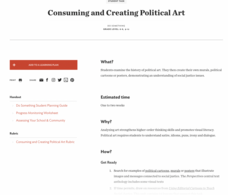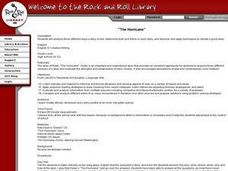The New York Times
Evaluating Sources in a ‘Post-Truth’ World: Ideas for Teaching and Learning about Fake News
The framers of the United States Constitution felt a free press was so essential to a democracy that they granted the press the protection it needed to hold the powerful to account in the First Amendment. Today, digital natives need to...
Curated OER
Satire and The Adventures of Huckleberry Finn
Does Mark Twain’s satire become sarcasm and does he cross the line of propriety in The Adventures of Huckleberry Finn? As an introduction of satire, class members view an excerpt from The Daily Show and discuss Stewart's use of this...
Utah Education Network (UEN)
Lessons Learned in Adventures of Huckleberry Finn
To conclude a study of The Adventures of Huckleberry Finn, class members create illustrated newsletters about Huck's lessons as he journeys down the Mississippi River. Using Microsoft Publisher, pairs copy, save, and import illustrations...
Teaching Tolerance
Consuming and Creating Political Art
A picture is worth a thousand words, but political art may be worth even more! After examining examples of political cartoons, murals, and other forms of public art, class members create their own pieces to reflect their ideals and...
EngageNY
Grade 11 ELA Module 2: Unit 2, Lesson 2
How did Elizabeth Cady Stanton advocate for women's rights? Pupils consider this question as they continue reading "An Address by Elizabeth Cady Stanton." They complete a Quick Write, analyzing how satire and sarcasm advance the author's...
Curated OER
Comedy Across the Curriculum
The New York Times Learning Network provides the resources that permit pupils to examine and then write and perform a fake news broadcast in the vein of “The Daily Show” or “Saturday Night Live” Weekend Update. The generated reports...
University of Wisconsin
Don Quixote in Wisconsin
Are you looking for background information on Cervantes and his Don Quixote? How about a study guide and discussion questions or project ideas? Even journal prompts, tests, and quizzes? A 98-page teaching guide simplifies the quest with...
Curated OER
Allusion in Poetry
Emerging writers identify allusion in poetry by listening to recorded poems, like Anyone Lived in a Pretty How Town. They also discuss what makes writing satirical and how writers use allusions to make satirical points.
National Endowment for the Humanities
Mark Twain and American Humor
“The Celebrated Jumping Frog of Calaveras County” is famous, in part, because it established a uniquely American form of humor. For this famous story, Mark Twain combines the tall-tale, the dialect story, and satire. Here is a resource...
Curated OER
SATIRE AND POLITICS
Students, after analyzing a satiric song written during the Prohibition era, illustrate how humor can be utilized as a political tool by writing satiric lyrics on a current political issue at the front of the news world today. They...
Curated OER
Celebration and Satire
Students analyze 19th-century paintings that depict celebrations in various ways. In this visual arts instructional activity, students view samples of paintings during the Industrial Revolution and discuss the effects of that time period...
Curated OER
Tee-Hee T.V.
Students examine the concept of satire by reading lyrics to a song and reading "Soap and the Campus: A Web-Site Spoof Succeeds." They create treatments for parodies based on current television shows.
Curated OER
Funny Business
Students discuss how much they understand of satire and parody. They read an article about an Iraq news parody show. They create and act out their own parody skit. They write an essay about using humor in grave situations.
Curated OER
How Poets Evoke Social and Historical Representations
Students explore how poems represent the social, historical, and cultural times that they were written in. In this poetry lesson plan, students compare and contrast poems with music of the time and explore implications of writing poems...
Curated OER
The Jungle Book Teacher's Notes
Rudyard Kipling's The Jungle Book is a childhood classic that readers of all ages enjoy. A teaching packet that includes instruction tips, comprehension strategies, background information on the book and author, and two fun worksheets.
Curated OER
Historical Witness: Social Messaging
Students create political cartoons that feature satire. In this political cartoon lesson, students examine examples of satire and caricature prior to creating their own political cartoons that feature the French Revolution or Industrial...
Curated OER
Historical Witness: Social Messaging
Students research the effects of the Industrial Revolution through art and satire. In this Industrial Revolution activity, students complete a Venn diagram, a symbolism study, a satire study, and complete an art activity to define the...
Annenberg Foundation
Utopian Promise
Scholars learn all about the Puritans in the third installment of a 16-part lesson series. After watching a video, they read and discuss biographies of Puritans and Quakers from American history, write journal entries and poetry, and...
Curated OER
'Me Fail English? That's Unpossible' : Studying Literature with "The Simpsons"
Does your class love The Simpsons? It might seem dated, but with reruns constantly popping up on television, this show still holds the attention of most of your learners. Play the opening sequence of an episode, and brainstorm any...
Curated OER
The Hurricane
Students analyze three different ways a story is told, determine truth and fiction in each story, and discover and apply techniques to narrate a good story.
Students listen to Bob Dylan's "The Hurricane" and watch the "R" rated movie,...
Curated OER
Twain: An American Humorist
Students examine American humor and character through analysis of works by Mark Twain. In this cross curricular instructional activity, students develop a definition of American humor and determine how and why some consider Twain the...
Curated OER
Political Cartoons: Thinking Broadly, Communicating Succinctly
Students think broadly about the tsunami disaster and its aftermath through studying cartoons. Students critically think about the literary devices the authors/artists use, such as satire, metaphor and personification.
Curated OER
Political Cartoons as Part of the Election Process
Students explore the impact of political cartoons on American elections. In this presidential elections lesson, students discuss the election process and then analyze political cartoons that were published during presidential elections....
























